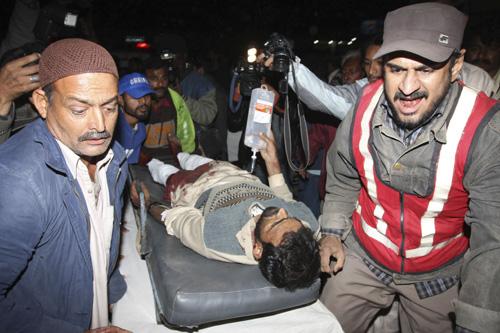Sharif: Musharraf ‘drowned’ Pakistan

Pakistani volunteers carry a man injured in a blast to a local hospital in Karachi, Pakistan, Monday. A powerful bomb exploded, killing at least nine people and injuring many more. It was not immediately clear who was behind the blast. Islamic militants Fareed Khan, The Associated Press
Jan 15, 2008
Last updated on May 12, 2016 at 07:59 p.m.
ISLAMABAD, Pakistan – Opposition leader Nawaz Sharif accused Pakistan’s president Monday of blindly following America and ordering anti-terror operations that have left the country “drowned in blood.”
Sharif’s tirade against President Pervez Musharraf came as troops and militants clashed near the Afghan border, leaving 30 dead. Separately, a bomb concealed on a motorbike in the southern city of Karachi killed at least nine people and wounded 52. Musharraf was in Karachi on Monday to inaugurate a road several miles from the bombing, but he did not appear to be the target.
“Musharraf has destroyed Pakistan. He is blindly following America’s orders,” Sharif told an election rally of about 3,000 people on the outskirts of the capital, Islamabad. “The whole of Pakistan is drowned in blood.”
The former prime minister reiterated his demand for Musharraf to step down and for a government of national unity to take power and oversee the Feb. 18 parliamentary elections. Opposition parties say the current caretaker administration is biased and the elections will be rigged in favor of the pro-Musharraf ruling party – allegations Musharraf denies.
Get The Daily Illini in your inbox!
The latest violence underscored the volatility of Pakistan as the nation heads into the elections. The United States and other Western nations are hoping the vote will usher in a period of stability as the country battles rising attacks by al-Qaida and Taliban militants.
Sharif’s speech was his first major campaign event since the Dec. 27 assassination of another key opposition leader, Benazir Bhutto.
It was one of his harshest attacks on Musharraf over his alliance with Washington forged after the Sept. 11 attacks and may strike a chord with Pakistanis disenchanted with the war on terrorism.
Militant attacks, perceived by many as a response to Pakistan army operations launched against al-Qaida and Taliban fighters in recent years, have deepened the sense of insecurity in this Islamic nation of 160 million people and risk undermining the political process.
There have been at least 20 suicide attacks in the past three months, mostly targeting security forces and hitting even relatively stable cities such as Lahore.
In the latest violence along the lawless Afghan border, suspected pro-Taliban militants ambushed a military convoy in Mohmand, a tribal region of South Waziristan. The attack sparked a clash that left 23 fighters and seven troops dead, said army spokesman Maj. Gen. Waheed Arshad.
Maulvi Muhammad Umer, spokesman for Tehrik-i-Taliban, an umbrella group for pro-Taliban forces in Pakistan’s tribal areas, claimed responsibility for the attack. He denied that the rebels had suffered any fatalities, but said some had been wounded.
Al-Qaida leader Osama bin Laden and his top deputy are believed to be hiding out somewhere in the lawless tribal region straddling the Pakistan-Afghan border.
In Karachi, the bomb planted on a motorbike near fruit vendors’ carts ripped through bystanders late Monday, killing at least nine people including two children.
There was no claim of responsibility.
The city is vulnerable to violent crime, but the scale of the attack is likely to raise suspicion of Islamic militant involvement. In the aftermath, local residents enraged by the blast hurled stones at passing vehicles.
The provincial home secretary Arif Ahmed Khan described it as a terrorist attack but did not blame anyone specific.
Pakistan is still recovering from a spasm of rioting after Bhutto’s death that left dozens dead and caused tens of millions of dollars in damage. It also forced a six-week delay in the elections.
Musharraf, who late last year gave up his position as army chief under intense opposition pressure, faces the prospect of a hostile parliament and possible impeachment if the opposition does well in the elections. Many expect Bhutto and Sharif’s parties to gain seats in parliament, but it remains to be seen whether they can secure the two-thirds majority needed to force him from office.
Despite Musharraf’s apparent unpopularity and allegations that elements within his government may have been involved in Bhutto’s assassination, a spokesman for her party said Monday that they were not ruling out working with the president if they win.
“These are bridges which we will cross when they come,” Farhatullah Babar said, echoing remarks reported in Pakistani media by Bhutto’s husband, Asif Ali Zardari, now the de facto head of the party.
Those comments were in sharp contrast to the fiery address of Sharif, although he has aligned himself more closely with Bhutto’s group since her slaying.
Associated Press writers Zarar Khan in Islamabad and Ashraf Khan in Karachi contributed to this report





